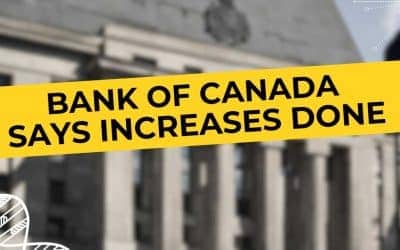Canada’s latest Gross Domestic Product (GDP) figures have exceeded expectations, signaling robust economic growth in the first quarter of 2023. The country’s economy expanded at an annualized rate of 3.1 percent, surpassing the forecasted 2.5 percent by Statistics Canada. This positive development has led economists to speculate about the possibility of rate hikes by the Bank of Canada to combat rising inflation. While some experts believe a rate hike may be imminent, others suggest that the central bank should exercise caution and wait for additional data before making any decisions.
GDP Growth Outperforms Forecasts
The first quarter GDP growth of 3.1 percent indicates the Canadian economy’s resilience amidst ongoing efforts by the Bank of Canada to curb inflationary pressures. The stronger-than-expected performance has prompted economists to consider the likelihood of the central bank deviating from its current pause in the interest rate tightening cycle.
Derek Burleton, deputy chief economist at TD Bank, suggests that the Bank of Canada may raise rates as early as next week, given the signs of strength observed in the second quarter. While a rate hike in June is not entirely ruled out, Burleton believes a July rate hike is more probable, as the central bank would have had the opportunity to assess additional labour market data. The Bank of Canada’s decision will be further informed by Statistics Canada’s report on the jobs market, scheduled for release on June 9.
Economists Weigh In
Andrew Grantham of CIBC Economics acknowledges that the April GDP estimate was stronger than anticipated, particularly given the impact of the federal public service workers’ strike on the economy during that month. Grantham believes that the overall strength of the economy, coupled with increased household spending, makes a rate hike during the summer months more likely. However, he still expects the Bank of Canada to wait for more data and revise their forecasts in the July monetary policy report before making a final decision on raising rates.
Similarly, Royce Mendes of Desjardins notes that the 3.1 percent annualized growth rate exceeded most economists’ forecasts and offers a positive outlook for the start of the second quarter. Mendes suggests that while the central bank may not take immediate action, the belief that a rate hike is looming in the summer is gaining traction. The acceleration of household spending and the robust economic growth provide compelling reasons for the Bank of Canada to seriously consider increasing rates.
In contrast, Stefane Marion, chief economist at the National Bank of Canada, believes that expectations of rate hikes following the recent GDP data may be premature. Marion points to declining business investments and profits highlighted in the StatsCan report, indicating that the past year’s significant interest rate hikes are starting to have an effect. Marion argues that the Bank of Canada should wait for further data on inflation and the economy before making any decisions, potentially postponing rate hikes until the fall.
What This Could Mean
Canada’s stronger-than-expected GDP growth in the first quarter of 2023 has sparked speculation about future rate hikes by the Bank of Canada. While some economists anticipate an imminent increase in interest rates, others advise caution and advocate for the central bank to gather more data and revise forecasts before taking action. The decision whether to raise rates in June or July remains uncertain, as the Bank of Canada balances the need to address inflationary pressures with the potential impact on business investments and profits. The central bank’s upcoming decisions will play a vital role in shaping the trajectory of Canada’s economic recovery.
As the Bank of Canada examines the GDP figures and analyzes the broader economic landscape, it faces a delicate balancing act. The stronger-than-expected growth in the first quarter provides evidence of the economy’s resilience and highlights






0 Comments